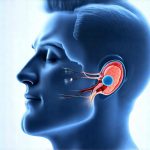Morning bloating – that uncomfortable feeling of fullness, tightness, and sometimes even pain in your abdomen upon waking – is a surprisingly common complaint. Many attribute it to dietary choices, stress, or hormonal fluctuations, and often these are contributing factors. However, there’s a less-recognized connection between sleep apnea and morning bloating that deserves closer examination. While seemingly unrelated, the physiological effects of interrupted breathing during sleep can significantly impact digestive function and fluid balance, creating conditions ripe for those unwelcome morning sensations. Understanding this link isn’t about self-diagnosing; it’s about recognizing potential contributing factors to your discomfort and fostering a more holistic approach to wellness.
The relationship between sleep apnea and bloating isn’t straightforward but centers around how disrupted sleep impacts the body’s natural processes. Sleep is when our bodies repair and regulate, including crucial digestive functions. When breathing repeatedly stops and starts during the night (the hallmark of obstructive sleep apnea), it triggers a cascade of physiological responses – increased stress hormones, decreased oxygen levels, and shifts in pressure within the chest cavity. These changes can directly influence gut motility, fluid retention, and even the composition of your gut microbiome, all potentially exacerbating bloating symptoms. Furthermore, individuals with sleep apnea often experience fragmented sleep, leading to increased cortisol levels which are also linked to digestive upset. You might find further information on how hormonal imbalances can worsen acid reflux https://vitagastro.com/how-hormonal-imbalances-can-worsen-acid-reflux/.
The Physiological Link Between Sleep Apnea & Digestion
Sleep apnea isn’t just a respiratory issue; it’s a systemic stressor that profoundly affects multiple bodily systems. During apneic events – periods of stopped breathing – the body reacts as if it’s suffocating. This triggers the sympathetic nervous system, releasing cortisol and adrenaline to restore oxygen flow. While vital for immediate survival, chronically elevated levels of these stress hormones disrupt normal digestive processes. Specifically, cortisol can inhibit gut motility, slowing down the movement of food through the digestive tract. Slower digestion means more time for fermentation by gut bacteria, leading to increased gas production – a major contributor to bloating.
This disruption extends beyond just speed; it also affects the balance between stomach acid and bicarbonate in the small intestine. Imbalances can lead to incomplete digestion and malabsorption of carbohydrates, creating an environment where gases are readily produced as food breaks down improperly. Additionally, sleep apnea is often associated with increased intestinal permeability – sometimes referred to as “leaky gut.” This means the lining of your intestines becomes more porous, allowing undigested food particles and toxins to enter the bloodstream, triggering inflammation and further digestive distress.
Finally, the repeated pressure changes within the chest cavity during apneic events can directly affect abdominal pressure, contributing to a feeling of fullness and discomfort. Think of it as an internal squeezing sensation that exacerbates any existing bloating. This is especially relevant for individuals who also have pre-existing gastrointestinal conditions like Irritable Bowel Syndrome (IBS) or GERD (gastroesophageal reflux disease). Understanding GERD symptoms may be linked to low zinc levels https://vitagastro.com/how-gerd-symptoms-may-be-linked-to-low-zinc-levels/ can provide valuable insight if you experience these issues.
How Sleep Apnea Impacts Fluid Balance & Bloating
Beyond digestive issues, sleep apnea can significantly impact fluid balance within the body, contributing to morning bloating. The hormonal shifts caused by interrupted breathing directly affect how kidneys regulate sodium and water excretion. Specifically, sleep deprivation and elevated cortisol levels are linked to increased aldosterone production – a hormone that instructs the kidneys to retain sodium. Sodium retention leads to water retention, resulting in edema (swelling) throughout the body, including the abdomen. This is often most noticeable upon waking as fluids have accumulated overnight while lying down.
Furthermore, sleep apnea can disrupt the release of atrial natriuretic peptide (ANP), a hormone that counteracts aldosterone and promotes sodium excretion. When ANP levels are low due to poor sleep quality, the body’s ability to eliminate excess fluid is compromised, further exacerbating bloating. This effect is particularly pronounced in individuals with pre-existing cardiovascular conditions or kidney problems, as their regulatory mechanisms might be already impaired.
It’s important to note that this isn’t simply water weight; it represents a shift in fluid distribution within the body. This can cause the abdomen to feel tight and uncomfortable, mimicking the sensation of bloating even without excessive gas production. The combination of digestive disruption and fluid retention often creates a particularly unpleasant experience for those with sleep apnea. Many people wonder how GERD affects morning breath https://vitagastro.com/how-gerd-affects-morning-breath-and-oral-health/ and this can be another symptom to watch for.
Identifying Potential Connections & Seeking Evaluation
If you consistently wake up feeling bloated and suspect sleep apnea might be a contributing factor, several clues can help you identify potential connections:
- Do you snore loudly or have been told you stop breathing during sleep?
- Do you feel excessively tired even after getting what seems like enough sleep?
- Do you experience frequent headaches, especially in the morning?
- Are you overweight or obese, which are risk factors for sleep apnea?
- Do you have a large neck circumference (over 17 inches for men and over 16 inches for women)?
These aren’t definitive diagnoses, but they warrant further investigation. It’s crucial to consult with a healthcare professional – preferably one familiar with sleep medicine – for proper evaluation. A sleep study, typically involving overnight monitoring in a lab or at home using portable devices, is the gold standard for diagnosing sleep apnea. This test measures your breathing patterns, oxygen levels, and brain activity during sleep, providing valuable insights into the severity of your condition. If you are concerned about these connections, it’s worth reviewing how GERD affects sleep apnea patients https://vitagastro.com/how-gerd-affects-sleep-apnea-patients/.
Lifestyle Adjustments & Potential Treatments
While awaiting diagnosis or alongside treatment for confirmed sleep apnea, certain lifestyle adjustments can potentially mitigate morning bloating:
- Dietary Modifications: Consider a low-FODMAP diet temporarily to identify potential food sensitivities contributing to gas production. Limit carbonated beverages and excessive salt intake. Focus on easily digestible foods and smaller, more frequent meals.
- Hydration Management: Drink plenty of water throughout the day but avoid large amounts right before bed. This can minimize fluid retention overnight.
3 Sleep Position: Try sleeping on your side instead of your back to reduce pressure on your abdomen and improve breathing.
If diagnosed with sleep apnea, treatment options vary depending on severity:
- Continuous Positive Airway Pressure (CPAP) is the most common and effective treatment, delivering pressurized air through a mask to keep airways open during sleep.
- Oral appliances can reposition the jaw to prevent airway obstruction in mild cases.
- In some instances, surgery may be considered.
Addressing the underlying sleep apnea is often enough to significantly reduce bloating symptoms as it restores normal hormonal balance and digestive function. Remember that these are general suggestions and should not replace professional medical advice. It’s also important to understand how skipping breakfast can lead to acid attacks https://vitagastro.com/how-skipping-breakfast-may-lead-to-midday-acid-attacks/.
The Importance of a Holistic Approach
Ultimately, understanding the link between sleep apnea and morning bloating highlights the interconnectedness of our bodily systems. It’s rarely a single factor causing discomfort; it’s often a combination of lifestyle habits, underlying health conditions, and physiological responses. Focusing on holistic wellness – prioritizing quality sleep, managing stress, maintaining a healthy diet, and seeking timely medical evaluation – is key to addressing the root causes of bloating and improving overall well-being. Don’t dismiss persistent morning bloating as “just something I deal with.” Explore potential contributing factors, including sleep apnea, and take proactive steps towards a healthier, more comfortable start to your day. Additionally, consider how alcohol-free drinks might still impact your stomach https://vitagastro.com/how-alcohol-free-drinks-may-still-affect-your-stomach/.


















